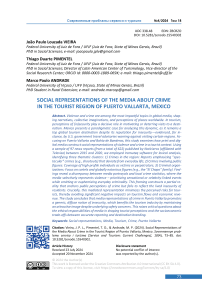Social Representations of the Media About Crime in the Tourist Region of Puerto Vallarta, Mexico
Автор: João Paulo Louzada Vieira, Thiago Duarte Pimentel, Marco Paulo Andrade
Журнал: Современные проблемы сервиса и туризма @spst
Рубрика: Региональные проблемы развития туристского сервиса
Статья в выпуске: 4 т.18, 2024 года.
Бесплатный доступ
Violence and crime are among the most impactful topics in global media, shaping narratives, collective imaginations, and perceptions of places worldwide. In tourism, perceptions of (in)security play a decisive role in motivating or deterring visits to a destination. Mexico presents a paradigmatic case for analyzing this dynamic, as it remains a top global tourism destination despite its reputation for insecurity—evidenced, for instance, by U.S. government travel advisories warning against visiting certain regions. Focusing on Puerto Vallarta and Bahía de Banderas, this study examines how print and digital media construct social representations of violence and crime in a tourist context. Using a sample of 97 news reports (from a total of 622) published by Noticieros (affiliated with Televisa) between 2015 and 2020, we employed Iramuteq software for lexical analysis, identifying three thematic clusters: 1) Crimes in the region: Reports emphasizing "spectacular" crimes (e.g., shootouts) that deviate from everyday life; 2) Crimes involving public figures: Coverage of high-profile individuals as victims or perpetrators; 3) Criminal organizations: Focus on cartels and globally notorious figures (e.g., the "El Chapo" family). Findings reveal a discrepancy between media portrayals and local crime statistics, where the media selectively represents violence – prioritizing sensational or celebrity-linked events while omitting or euphemizing everyday criminality. This framing constructs a partial reality that anchors public perceptions of crime but fails to reflect the lived insecurity of residents. Crucially, this mediated representation minimizes the perceived risks for tourists, thereby avoiding significant negative impacts on tourism flows and economic revenue. The study concludes that media representations of crime in Puerto Vallarta promotes a generic, diffuse notion of insecurity, which benefits the tourism industry by maintaining an attractive image despite underlying safety concerns. This raises critical questions about the ethical responsibilities of media in shaping tourist perceptions and the socioeconomic trade-offs between accurate reporting and destination branding.
Social representations, Media, Tourism, Crime, Puerto Vallarta
Короткий адрес: https://sciup.org/140309807
IDR: 140309807 | УДК: 338.48 | DOI: 10.5281/zenodo.15540302


